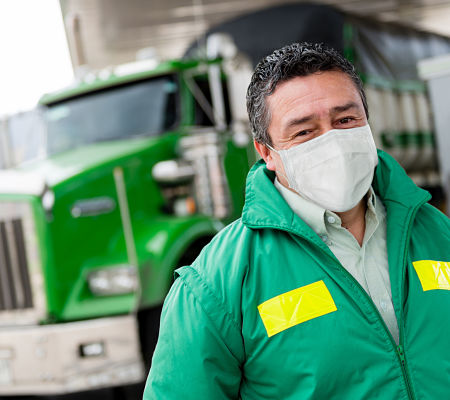Online driver survey reveals COVID-19 challenges for truckers
A May online survey conducted by Professional Driver Agency (PDA) found that 72 percent of the 1,600 trucker respondents are most concerned about bringing the COVID-19 virus home to family and friends.
“For us, this was the key takeaway from the survey,” said Scott Dismuke, director of operations at PDA. “While risking personal exposure to COVID-19, this is an overwhelming majority of drivers that are even more concerned about coming home and exposing family and friends.”
Of the drivers concerned about exposing their family to COVID-19, 42 percent said they were staying out on the road longer instead of taking home time.
“A significant number of drivers are foregoing home time,” Dismuke said. “These men and women already sacrifice time with loved ones and are now sacrificing even more during the pandemic.”
PDA surveyed nearly 20,000 drivers across the U.S. Drivers came from twenty-two companies and included small, medium, and large trucking firms.
Driver respondents included dry van, flatbed, intermodal, bulk, auto hauler, refrigerated, and household goods drivers. The gender breakdown was 87 percent male and 13 percent female.
PDA said the survey revealed the following trends:
- Most drivers feel safe with simply driving during the pandemic.
- While most drivers reported feeling safe on the road, nearly half listed concerns for their personal health.
- More access to personal protective equipment was a top action that would make drivers feel safer on the road.
- Accessibility to food/drink on the road was the second-highest issue that would make drivers feel safer on the road.
- Driver concerns include economic instability decreasing their miles, lower compensation, reduction in freight volumes, and closed accounts.
Respondents answered five questions:
Q1: Do you feel safe driving during the COVID-19 pandemic?
63.3 percent said yes, 36.7 percent said no.
Q2: What could be done differently to make you feel safer on the road?
54.2 percent said more PPE; 50 percent said better access to food/drink; 48.4 percent said cleaner travel centers/rest areas; 31.6 percent said safer conditions at shippers; 26.6 percent said more access to testing closer to interstate exits; and 14 percent had other responses. (Respondents could select multiple answers).
Q3: If you are concerned about COVID-19, what concerns you the most?
72.7 percent said bringing the virus home to family and friends; 45 percent said personal health; 23.2 percent said job-related issues; and 9.9 percent had other answers. (Respondents could select multiple answers).
Q4: If you are concerned about exposing your family to the virus, are you staying out longer instead of taking home time?
43 percent said yes, and 57 percent said no.
Q5: If you have concerns about your job, what concerns you the most?
50.2 percent said access to amenities; 44.3 percent said low freight; 44.2 percent said traveling to hot spots; 40.2 percent said miles decreasing; 37.9 percent said compensation decreasing; 37 percent said no access to PPE; 18 percent said accounts closing; and 7.8 percent had other answers. (Respondents could select multiple answers).
Key takeaways from the survey, according to PDA, were as follows:
- Drivers see COVID-19 as a health issue versus a safety issue.
- Social distancing is not usually an issue.
- Nearly 100 drivers said that nothing could make them feel safer on the road.
- Access to food, drink and restrooms has been an issue.
- Access to COVID-19 testing is not a high priority.
- Hazard pay is an issue.
- Many drivers are staying on road to avoid spreading the virus to family.
- Thirty-seven percent of drivers feel they do not have access to necessary PPE.
“I think the results of this survey convey what we already knew about America’s professional truck drivers — they are risking their health to keep our economy moving and supply chains open during this pandemic,” Dismuke said. “These men and women, along with our first responders and health care professionals, have been heroic in their efforts by keeping grocery stores stocked and other vital products moving over the last couple of months.”
Bill Matheson, president of intermodal services at Schneider National, said he is hopeful the industry will come through the crisis intact.
“We’ve got 30 million people furloughed or out of work. That is certainly going to have an economic impact given that we rely on consumption to drive the demand for goods. I think we are all confident that we are going to move through this, and some things will be different —some permanently — and some will move back to the normal that we used to know,” he said. “But the question is how quickly? For those people who are furloughed, how quickly will they be called back to work, and have they dug themselves into a financial hole that will change their spending patterns? When they come back, will it be a snapback or a long, slow comeback?” he told Fleet Owner.






